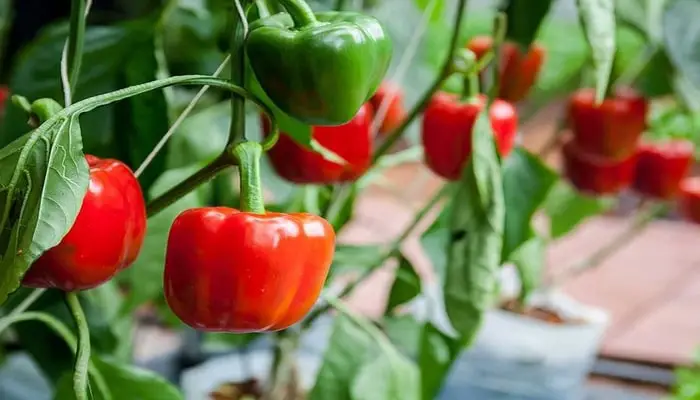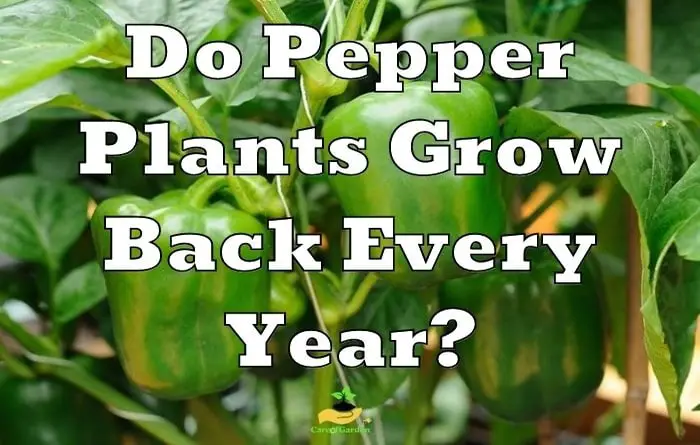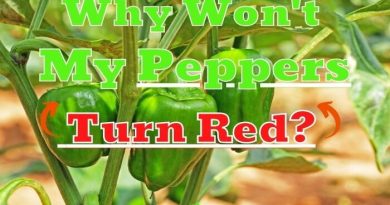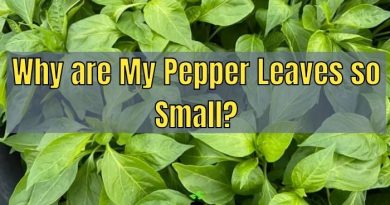Do Pepper Plants Grow Back Every Year? (The Surprising Truth)
Pepper plants are a popular choice among gardeners due to their versatility and the variety of peppers they can produce. However, one question that arises for many gardeners is whether pepper plants grow back every year.
As a gardener myself, I have come across this question many times, and in this article, I will provide a comprehensive answer.
According to my research and expertise, pepper plants are perennial and can grow back every year if they are provided with the correct growing conditions and adequate care. However, the ideal growing conditions, such as temperature, soil and fertilizer type, availability of sunlight and water, and preparation before overwintering, must be met. Overwintering pepper plants is a good way to keep them alive longer. Therefore, with proper care, pepper plants have the ability to grow back every year.
Pepper plants are annuals, perennials, or biennials?
Pepper plants can be categorized as either annuals, perennials, or biennials, depending on their life cycle. Annual plants complete their life cycle within a single growing season, whereas perennial plants can live for several years, and biennial plants have a two-year life cycle.
Most pepper plants are categorized as annuals or short-lived perennials. This means that they complete their life cycle within one or two growing seasons. However, some varieties of pepper plants, such as the Capsicum chinense and Capsicum baccatum, can live for several years, making them perennial plants.
Simply put, pepper is a perennial plant, but growers, for the most part, treat it as an annual. Most commercial pepper or chili growers start their crop from seed (hybrid) in a protected environment indoors.
All varieties are basically perennial, but overwintering peppers is only possible in a heated greenhouse or conservatory. Continued cultivation is particularly worthwhile for slow-growing ornamental peppers such as piri-piri or bell chillies.
Why some pepper plants may not grow back every year?
Although pepper plants are often categorized as annuals, they can sometimes behave as perennials under certain conditions.
However, there are several reasons why pepper plants may not grow back every year, including:
Temperature
First of all, whether it’s pepper plants still indoors or pepper plants already planted in your garden, what pepper plants like the most is heat.
Pepper plants are sensitive to cold temperatures, and if the temperature drops below 50°F, it can damage the plant, making it difficult for the plant to grow back in the following season.
I have been growing peppers in my garden successfully for many years, but I struggled during the seed starting process to get them to sprout. And in the past, when they germinated, the plants grew very slowly.
Peppers like very hot temperatures for germination. A soil temperature of 85 degrees F is ideal. This high temperature is difficult to maintain during the seed starting process in most homes in the winter.
Diseases
Pepper plants can be susceptible to various diseases, such as phytophthora blight and blossom end rot. If the plant is infected, it may not be able to grow back the following year.
Pests
Pests such as aphids, spider mites, and whiteflies, as well as diseases such as bacterial spot and powdery mildew, can damage pepper plants and prevent them from growing back the following year.
Pepper plants can be attacked by various pests, such as aphids and spider mites. If the infestation is severe, it can weaken the plant and prevent it from growing back.
Improper Care
If the pepper plant is not cared for properly, such as not being watered enough or not receiving enough sunlight, it may not grow back the following year.
Pepper plants require well-draining soil that is rich in organic matter and nutrients. If the soil is poor or the plant does not receive adequate nutrients, it may not be able to grow back the following year. Common nutrient deficiencies in pepper plants include nitrogen, phosphorus, and potassium.
Factors that can affect whether pepper plants grow back every year
Several factors can affect whether pepper plants will grow back every year. These include:
| Factor | Description |
|---|---|
| Variety | Some varieties of pepper plants are better suited for growing as perennials than others. |
| Growing Conditions | The growing conditions of a pepper plant can affect whether it will grow back every year. |
| Pruning | Regular pruning can help to promote new growth and prevent the plant from becoming too bushy or leggy. |
| Harvesting | Harvesting pepper plants regularly can help to promote new growth and prevent the plant from becoming too top-heavy. |
| Watering | Pepper plants require regular watering, especially during periods of hot, dry weather. |
| Soil | Pepper plants require well-draining soil that is rich in organic matter and nutrients. |
| Fertilizer | Pepper plants require a balanced fertilizer that contains all three major nutrients: nitrogen, phosphorus, and potassium. |
| Climate | Pepper plants are not very cold-hardy and are not likely to survive in areas with harsh winters. |
| Pest and disease control | Controlling pests and diseases can prevent damage to the plant and increase the likelihood of it growing back each year. |
Climate
The climate plays a crucial role in whether pepper plants can grow back every year. Pepper plants require warm temperatures and plenty of sunlight to thrive.
Pepper plants are typically grown as annuals in regions with cold winters. In areas with mild winters, pepper plants can be grown as perennials, but they may not survive if temperatures drop below 30°F.
Soil
The quality of the soil can have a big impact on whether a pepper plant will grow back every year. Pepper plants require well-draining soil with a pH level of around 6.0 to 6.8, which is rich in nutrients.
Having a poor soil in which the pepper plant does not receive adequate nutrients, will prevent pepper from growing back the following year.
Water
Pepper plants require consistent moisture to grow. However, overwatering can lead to root rot, and underwatering can cause the plant to wither and die.
It is important to water pepper plants deeply and consistently, but avoid overwatering. The best way to water pepper plants is to water deeply but infrequently, allowing the soil to dry out slightly between waterings.
Fertilizer
Peppers require a balanced fertilizer that is rich in nitrogen, phosphorus, and potassium.
Pepper plants require adequate nutrients to grow. However, too much fertilizer can lead to excessive foliage growth and prevent the plant from producing fruit.
How to Help Pepper Grow Back Every Year

Pepper plants can be either annual or perennial, and their requirements differ based on their classification. Annual pepper plants complete their life cycle in one growing season and die off at the end of the season. To help peppers grow back every year, we need to make sure that they produce seeds which will germinate in the next season.
This means allowing some of the peppers to fully mature and dry on the plant, and then collecting and storing the seeds properly. When planting the seeds the following season, be sure to provide optimal growing conditions such as adequate sunlight, water, and nutrients.
This includes regular pruning to promote new growth, providing adequate nutrients through fertilization, and protecting the plants from extreme temperatures and pests. It’s also important to monitor the plants for any signs of disease or nutrient deficiencies and address them promptly.
To help your pepper plants grow back every year, follow the steps presented below:
- Prune regularly: Pruning helps to keep the pepper plant healthy and encourages new growth. Cut back any dead or diseased branches and trim the top of the plant to encourage bushier growth.
- Fertilize: Pepper plants need regular feeding to grow well. Use a balanced fertilizer with equal parts nitrogen, phosphorus, and potassium. Apply the fertilizer every three to four weeks during the growing season.
- Water regularly: Pepper plants need consistent moisture to thrive. Depending on weather and soil you can water once or twice a week.
- Mulch: Mulch around your peppers to help them retain moisture and prevent weeds growing.
- Protect from pests: Inspect pepper plants regularly in the winter and take necessary action if you notice any infestations. Use natural methods like insecticidal soap or neem oil to control pests.
By following these steps, you can help your pepper plants grow back every year and ensure a bountiful harvest. Remember to also consider the specific needs of your pepper plant variety and address any issues promptly to ensure its long-term success.
Annual vs. Perennial Pepper Plants
Pepper plants can be categorized into two types based on their lifespan: annuals and perennials. Here’s a comparison table to help you understand the differences between the two:
| Criteria | Annual Pepper Plants | |
|---|---|---|
| Lifespan | One growing season | Multiple growing seasons |
| Yield | High yield | Lower yield |
| Harvesting time | One-time harvest | Multiple harvests |
| Overwintering capabilities | No | Yes |
| Hardiness zones | Zones 9-11 | Zones 8-11 |
Annual pepper plants complete their life cycle in one growing season and die after producing fruit. They typically have a higher yield but need to be replanted every year.
Perennial pepper plants, on the other hand, can produce fruit for multiple growing seasons and have a lower yield but don’t need to be replanted every year.
Another benefit of perennial pepper plants is their overwintering capabilities. They can survive the winter and continue growing the next year, provided they’re grown in the appropriate hardiness zones.
Perennial pepper plants are hardy in zones 8-11, while annual pepper plants are hardy in zones 9-11.
Understanding the differences between annual and perennial pepper plants can help you choose the right type of plant for your garden and plan accordingly.
Will Pepper Plants Grow Back After Winter?
Pepper plants are not cold-hardly and will not survive in areas where temperatures drop below freezing, but can come back after winter if they are properly overwintered.
Here is how to overwinter pepper plants:
The first step in storing peppers for the winter is to bring them indoors. At the same time, carefully spray the plant. This will help eliminate any pests that may be hiding on the leaves. Remove all peppers, ripe or unripe, from the plant.
In the second step, you need to find a dry place to store the pepper plant, where the temperature will be around 55°F (13°C).
The ideal option is an attached garage or basement. The plant does not need a lot of light for winter care of peppers, so in these places there is enough light near a window or near a lamp with a fluorescent lamp.
Once you place the pepper plant in that spot, cut back on watering. When keeping peppers in winter, you will find that they require much less water than in summer.
When wintering pepper, you need to water the plant only once every three to four weeks. Don’t let the soil get wet, but don’t let it dry out completely either.
Trim the branches of the pepper plant down to the few main ‘Y’s on the plant, leaving about 1-2 inches for the top of the ‘Y’. This step in overwintering pepper plants will remove dying leaves and make the plant less susceptible to pests. In spring, the pepper plant will grow new branches.
To complete winter pepper care, about a month before the date of the last frost, remove the pepper plant from a cool room and move it to a lighter and warmer place.
You can even use a heating pad under the pot for extra warmth. Resume watering, but be careful not to overwater the plant. After a week or so, you should see new growth.
Frequently Asked Questions
To ensure pepper plants grow back every year, it’s important to prune them regularly to encourage new growth and prevent diseases. Additionally, provide consistent watering and fertilizing throughout the growing season, and plant the peppers in a location with plenty of sunlight and good drainage. In colder climates, it’s recommended to overwinter the plants indoors and follow proper winter care techniques.
If you put in good winter protection, the success rate for year-round chilies is close to 100% .
As soon as you begin to notice the first shoots in spring, wait a few days and then move the plant outdoors, in a sunny place, or remove the TNT sheet.
Yes, pepper plants will regrow leaves. Trimming the branches down to a few main “Y” junctions during winter care will help remove dying leaves and make the plant less susceptible to pests. In the spring, new branches will grow and replace the lost leaves.




